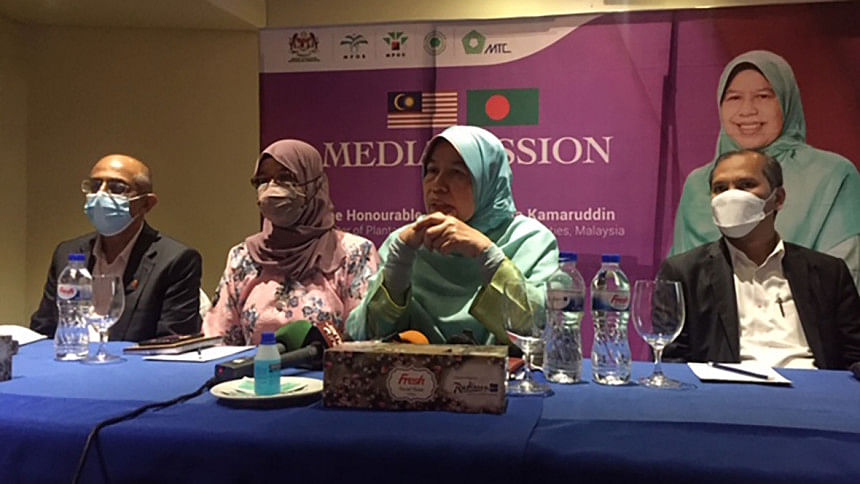Demand for palm oil, rubber, timber increased in Bangladesh: Malaysian minister

Malaysia finds huge potentials of investments in Bangladesh, especially in palm oil, rubber and timber industries as the demand for such commodities has increased in Bangladesh in the recent times.
"Compared to December last year, palm oil import from Malaysia to Bangladesh has increased by 113 percent. Similarly, import volume of other products like timber and rubber has also gone up," said Malaysian Plantation Industries and commodities Minister Zuraida Kamaruddin.
Bilateral trade between the two countries is more than $2 billion, with Malaysia exporting products worth $1.5 billion annually.
Bangladesh's rising market of 180 million people and growing housing and construction industries is a good opportunity for Malaysia to invest in and also increase export, Zuraida told journalist at a press conference at a city hotel today.
Zuraida arrived in Bangladesh on February 23, after visiting India, to see the potentials of boosting bilateral trade and investments.
She held meetings with the Prime Minister, Commerce Minister, Finance Minister, business community. After returning to Malaysia, she will also meet the Malaysian investors and convince them that Bangladesh is a lucrative investment destination.
Bangladesh has GSP facility for EU, it has duty-free access to India and China, and the country has favourable policies for foreign investors. Given all these factors, it is very much feasible that Malaysian companies invest here, she said.
Bangladesh's housing and construction is booming, it is building lots of infrastructure including roads, railways and highways. Malaysia has expertise in these sectors and can both increase its exports and the Malaysian companies can also invest here, she said.
"Some businessmen and ministers said they have land and Malaysian companies can have partnership or collaboration," Zuraida said.
Malaysia can export timber, rubber and palm oil and these can have processed here. Also, Malaysia can export finished products, she said.
On the other hand, Bangladesh can export to Malaysia textiles, footwear and lather products.
In June, Malaysia will host agri-commodity exhibition where foreign companies can meet up and explore the possibilities of partnership and collaboration.
As part of boosting Malaysian export post-Covid, the Malaysian minister is visiting South Asia, Middle East and UK.
Asked when Malaysia could open up market for Bangladeshi workers, she said it is expected to start soon but she was not in a position to say that.
She said her ministry is responsible for the welfare of the workers, but not recruitment.
Asked about labour abuses, Zuraida said there is not much report of abuses in the plantation industries.

 For all latest news, follow The Daily Star's Google News channel.
For all latest news, follow The Daily Star's Google News channel. 



Comments